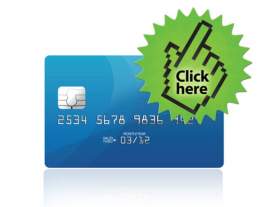
What Are Credit Cards

What are Credit Cards?
Credit cards are plastic cards that enable an individual to purchase goods, products or services through the use of credit. Credit cards are carried by the majority of consumers in the United States. Holders of credit cards have the ability to purchase goods through a credit line that is awarded by a financial institution, such as a bank or credit card company. These institutions will offer an individual (with a satisfactory credit score) a credit card that is accompanied by various terms and interest rates.
Example of a Credit Card Bill and how the APR works
These rates are applied to the individual’s balance at the end of each billing cycle. For example, if an individual is given a credit card with $500 worth of available credit and an APR of 20% and the individual spends throughout the month, or length of the cycle, the full amount of available credit, he or she is required to pay the lending institution the full $500. If the individual does not pay the $500 and only pays the minimum (typically $15), the APR of 20% will be applied to the next month’s bill in the form of a monthly fee (.20/12), or .01667. Add 1 to this figure to reveal 1.016, which is then multiplied by your remaining balance. Therefore, if you have $485 due next month, you will take $485 and multiply it by 1.016 to yield a new balance of $492.76. The terms attached to each credit card will vary based on the issuing institution’s protocol and the credit score of the prospective borrower.
Those individuals with lower credit scores (meaning their debt to credit ratio is high) are viewed as risky candidates for their higher probability to default on payment. As a result of this evaluation, these individuals will be given a credit card (if approved) with a higher interest rate and more complicated terms.
How do I obtain a Credit Card?
In order to obtain credit cards, a consumer must complete a credit card application. The applications and the requirements to obtain credit cards will vary based on the banking institution. However, each application will require the fulfillment of personal information as well as a review of the individual’s credit history. A credit history refers to the consumer’s financial past, and more specifically, their ability to repay loans or debt payments.
When consumers use credit cards they are purchasing the product in good faith, meaning there is no exchange of liquid funds for the obtainment of the goods. Rather, the item is purchased with the understanding that the consumer will pay (in full) the amount owed for the products purchased.
How do Credit Cards work when I make a purchase?
When a purchase is made via a credit card, the vendor obtains the underlying credit card’s information from the holder. The bank issuing the card will reimburse the vendor for the products purchased and eventually the cardholder will repay the bank through periodic monthly payments. Financial institutions make money through the issuance of credit cards because each purchase is attached with interest payments. In addition, if a holder fails to make their payments on time, the issuer of the credit card will charge a fee.
Laws regarding Credit Cards
The laws which govern credit card use regulate interest rates and the amount of late fees delivered by the underlying financial institution. The Federal Reserve has issued rules and detailed guidelines for implementing each phase of credit card law. Currently, financial institutions operate with limited interest rate hikes, limited universal default, and the right for the consumer to opt out of their current credit contract. Additionally, as a result of the economic collapse, the Federal Reserve has instituted laws which allow individuals more time to pay off their monthly bills and limit the amount of fees attached to late payments.
NEXT: What Does My Credit Card Numbers Mean





















